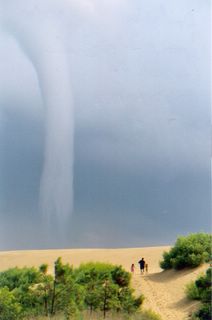Why Dare County/CHAPA might win Part: V.06 (beta)
posted @ 10:17 AM
-
0 comments
The Island Free Press has a good piece on the lawsuit to block US Fish and Wildlife Service from adopting additional regulations to protect piping plover winter habitat. This issue first surfaced back in June. Now a coalition of Dare and Hyde counties and the Cape Hatteras Access Preservation Alliance have filed a notice of intent to sue the federal government over proposed piping plover regulations. The groups won an earlier suit:
In 2003, CHAPA and Dare and Hyde counties sued the Fish and Wildlife Service over the designation of wintering habitat, and in 2004, a federal judge ordered the agency to redo the plan.The notice of intent basically says that the FWS didn't do what the judge said. It maintains that the FWS didn't properly consider the impacts of the rule making. A main piece of the argument is that the economic analysis the FWS relied on (Vogelsong) was not done in scientifically valid way. A second key point is that existing management plans are adequate to protect the birds.
The court found and directed the following:
1. The court directed that FWS show that primary constituent elements -- the physical and biological features essential to piping plover conservation -- exist on areas that are designated. It ordered FWS to clarify whether that these physical and biological features are essential for the recover of the piping plover and may require special management or protection.
2. The court found that the FWS designation of critical habitat must include compliance with the National Environmental Policy Act. The court found that the Environmental Impact Analysis did not comply with the requirements of the National Environmental Policy Act, was incomplete, and possibly contained erroneous information.
3. The court found that the FWS's economic analysis was arbitrary and capricious, in that it considered the impact of off-road vehicles and other human use of beaches, but did not address information in the record about the possibility of closures of the beaches to such use or how off-road vehicle use might be affected by the designation.
4. The court also found that the FWS omitted from the economic analysis the full costs associated with the designation and ordered the FWS to reconsider them.
I am not a lawyer and I am not well versed in environmental law. Neither of those things have ever stopped me from expressing an opinion about legal issues so here goes.
Legal arguments generally fall in 3 groups based on the source of the argument. The strongest legal arguments generally cite directly from the statute ie. the ESA say the government shall take no action that impacts endangered species, allowing beach driving near nests impacts endangered species. The next level of argument is to find other cases that support your interpretation of the law. These arguments are harder to judge because lawyers don't list the cases that don't support their position. The last category is suits that try to create a new interpretation of the rule. These are the hardest to win. They generally cite cases in different areas of law and attempt to apply them to the new case, for example using a land use case to interpret a law about water quality.
The notice is written in the middle mode. Not much in the way of statute but a lot of case law. It looks promising but there are a lot of variables. First and foremost is who hears the case. I expect the suit will be filed in the same jurisdiction that heard the original case (DC I think). This would mean the previous rulings would carry great weight.
It is good to see the county moving first. These rules impact not just beach access but the replacement of the Bonner Bridge as well.
It is not clear how this will affect the NPS rule making process. The FWS rules would supersede the ORV management plan since the plan would have to comply with the rules. If anything it probably means more delays and more time in court. As Cher once said "and the beat goes on"
Ciao








0 Comments:
Post a Comment
<< Home